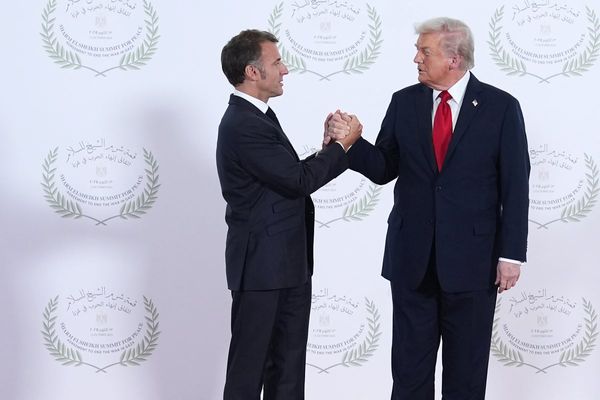
One must acknowledge the remarkably effective Jewish community organisations in Australia behind the latest antisemitism report. Collectively, with their News Ltd megaphone, they have successfully badgered the government of the day, cowed the ABC, intimidated vice-chancellors and threatened to defund arts organisations.
With the ability to garner prime ministerial dinners, a battalion of lobbyists has gained access to editors, duchessed willingly seduced journalists keen to enjoy junkets and corralled more than 500 captains of industry to subscribe to full-page ads against antisemitism and thereby blurring political argument with prejudice and bias. It is no surprise that this relentless propaganda effort has paid off.
The appointment of Jillian Segal to special envoy to combat antisemitism, routinely described as an “eminent corporate lawyer”, does not seem to bring scholarly expertise to the role. With respect one might argue that Segal’s previous position as president of ECAJ, an unequivocal advocate for Israel as the Jewish homeland, should have disqualified her for the role.
Numbers have been cited as evidence of an escalation of antisemitic incidents that had apparently occurred after 7 October 2023. Of course, nuance or accuracy isn’t paramount in this campaign. So, 16 students at Sydney University feeling intimidated by the slogan “from the river to the sea” was reframed as 250 complaints submitted to parliamentary inquiry. A childcare centre that was not in fact a Jewish centre was added to the list of terrifying antisemitic attacks. The individuals police believe were hired by criminals seeking a reduction in their prison sentences who allegedly placed combustible material in a caravan became a “terrorist plot”, the hooligans (still unidentified seven months later) who firebombed the Addas Israel synagogue brought out a rash of politicians to deplore the incident.
This isn’t a full list of incidents, and it should not be necessary to make clear that I deplore all racist attacks and that people should be free to worship, protest, identify in whichever way they choose, in our society. But we do need to insist on contextualising these antisemitic attacks: some are genuinely antisemitic, some are opportunistic byproducts of other, unrelated conflicts and some are by pro-Palestine activists.
The publication of the special envoy’s plan is the latest flex by the Jewish establishment. The in-house scribes have been busy: no institution, organisation or department is exempt from the latest push to weaponise antisemitism and insist on the exceptionalism of Australian Jewry. One might pause to wonder what First Nations people, who are the victims of racism every day, feel about the priority given to 120,000 well-educated, secure and mostly affluent individuals.
The omissions are as important as the inclusions in the plan. Zionism is mentioned only once, in the section demanding the adoption of the IHRA definition. The IHRA is a contentious document, a word salad as a consequence of editing by committee; but that has not stopped Jewish representative bodies advocating for its adoption. The campaign has not been entirely successful, in significant instances actually stiffening the resolve of some to insist that antisemitism, just like all other forms of racism, is to be emphatically rejected. The plan “requires” the adoption of the IHRA definition by all levels of government, institutions and regulatory bodies. The examples proffered plainly conflate Jewishness with the State of Israel. The plan says “The IHRA definition is key to distinguishing legitimate criticism from hate, especially when anti-Zionism masks antisemitism”. There you have it. So antisemitism is anti-zionism and anti-zionism is antisemitism. QED.
The plan is certainly guilty of overreach. The envoy wants to strengthen legislation apparently. Isn’t that the role of the government of the day? Who is to be the arbiter? Who is to be the judge, for example, of universities and their report cards? Who will adjudicate “accountability” in the media? Who will recommend defunding which artist? Should this government endorse this proposal, it will clearly be the envoy.
Fortunately, a suite of laws protecting us from racism, discrimination, hate speech and incitement to violence are already deeply embedded in our civil society. No university is oblivious to these laws, no public broadcaster, no arts organisation.
Educating future generations about the Holocaust has long been a priority. I hope the envoy is aware of the work done engaging thousands of school students at such institutions as the Melbourne Holocaust Museum where my own mother was the education officer for over a decade. If the envoy is concerned that school students aren’t sufficiently well versed in the horrors of the Holocaust, she might take heart from such evidence as the sales of Anne Frank’s diary continue unabated, in the past five years more than 55,000 copies were sold in Australia.
The envoy helpfully proposes to nominate “trusted voices” to refute antisemitic claims – yet again seeking to prescribe who speaks and which views are deemed acceptable. One hopes that media organisations are resolute against the plan’s determination to monitor, oversee and “ensure fair reporting to avoid perpetually incorrect or distorted narratives or representations of Jews”. It seems that the envoy wants to determine what is legitimate reportage. Freedom of the press is of less importance. Independent journalism that is factual and speaks the truth is lightly abandoned.
Universities appear to be on notice: adopt the IHRA definition, act on it or be warned that in March 2026 a judicial inquiry will be established as the envoy demands.
Cultural organisations be warned – your funding could be at risk too. There isn’t a cultural organisation in the country that doesn’t have well-argued codes of conduct for staff, artists and audiences – in place well before the 7 October attack to combat homophobia, racism and hate speech. Now it is proposed that a Jewish Cultural and Arts Council is to advise the arts minister. To privilege one ethnic community over others is deeply offensive and dangerous.
The glaring absence here – a tactical move – is the question of Israel and its war on Gaza, as if antisemitism is a particular problem absent of any connection to Middle Eastern realpolitik. One oft repeated concern in the document is that younger Australians are more susceptible to antisemitism than older generations. The reason, clearly unpalatable to the authors of this document, is that younger, media literate Australians recognise the steadfastly uncritical advocacy of Israel by Australia’s Jewish leadership. Young people see the death and destruction in the occupied territories and cannot avoid the blindingly obvious connection. If the actions of Israel in the past 20 months or indeed the past 75 years doesn’t engender any dissent in the diaspora, it’s unsurprising that critics of Israel conclude that Jews are to be condemned for their appalling myopia and lack of moral clarity.
Louise Adler is a former publisher







